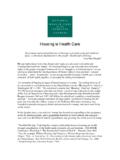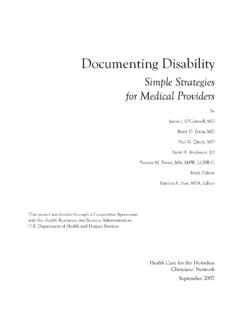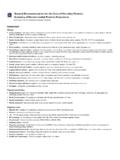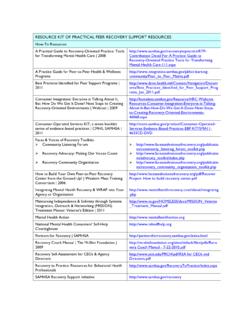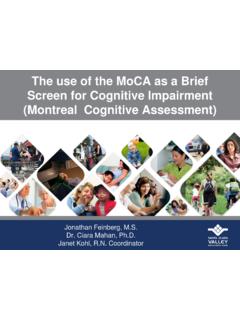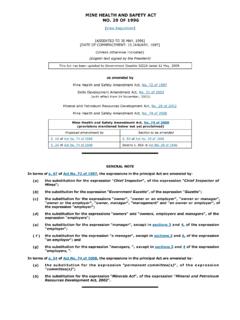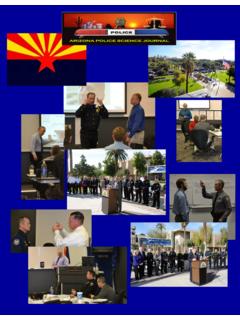Transcription of Developing Outcome Measures - National Health …
1 Developing Outcome Measures to Evaluate Health Care for the Homeless Services Patricia A. Post, MPA Editor National Health Care for the Homeless Council May 2005 Developing Outcome Measures to Evaluate HCH Services This project was developed with support from the Bureau of Primary Health Care, Health Re-sources and Services Administration, Department of Health and Human Services. All material in this document is in the public domain and may be used and reprinted without spe-cial permission. Citation as to source, however, is appreciated. Suggested citation: Post P (Editor), Isbell FE, Gray EM, Perlman J, Peterson S, Schlegel P, Treherne L, Watts GR. De-veloping Outcome Measures to Assess Health Care for the Homeless Services, 62 pages.
2 Nashville: National Health Care for the Homeless Council, Inc., 2005. National Health Care for the Homeless Council, Inc. Box 60427 Nashville, TN 37206-0427 voice: 615/226-2292 fax: 615/226-1656 e-mail: council@nhchc website: National Health Care for the Homeless Council iDeveloping Outcome Measures to Evaluate HCH Services ACKNOWLEDGMENTS The National Health Care for the Homeless Council expresses its gratitude to the following indi-viduals, who were primarily responsible for information and recommendations contained in this report: HCH Outcomes Work Group Frances E. Isbell, MA executive Director, Healthcare for the Homeless Houston, Houston, Texas Eleanor M. Gray, RN former Director, Cooperative HCH Program, Northeast Valley Health Corporation, San Fernando, California (representing 9 HCH grantees in CA, AZ, and NV) Jennifer Perlman, PsyD, Manager of Quality Improvement, Colorado Coalition for the Home-less, Stout Street Clinic, Denver, Colorado Sharon Peterson, BSN, RN, Manager, Health Care for the Homeless Program, Crusaders Cen-tral Clinic Association, Rockford, Illinois Pam Schlegel, BSW, HCH Project Manager, Missoula City County Health Department, Part-nership Health Center, Missoula, Montana.
3 And Judy Stewart, HCH Coordinator for 4 project sites in Montana: Missoula, Billings, Helena, and Butte Louise Treherne, LCSW-C, Vice President, Clinical Affairs, Health Care for the Homeless, Inc., Baltimore, Maryland G. Robert Watts, MPH, MS, executive Director, Care for the Homeless, New York, New York We also extend special thanks to the following individuals who commented on drafts of this report prior to publication: Susan M. Kline, MN, ARNP, Clinical Specialist, National Health Care for the Homeless Council, Public Health - Seattle and King County, Seattle, Washington John N. Lozier, MSSW, executive Director, National Health Care for the Homeless Council Suzanne Zerger, MA, Research Specialist, National Health Care for the Homeless Council, To-ronto, Ontario, Canada Cheryl Zlotnick, RN, , Associate Research Scientist, Center for the Vulnerable Child, Oakland, California Patricia A.
4 Post, MPA, Editor National Health Care for the Homeless Council Nashville, Tennessee National Health Care for the Homeless Council iiDeveloping Outcome Measures to Evaluate HCH Services Table of Contents executive SUMMARY 1 INTRODUCTION 2 Purpose of This Project Background Definition of Key Terms 2 3 4 I. CHALLENGES & OPPORTUNITIES 6 Challenges Opportunities 6 13 II. HOW FAR WE VE COME 16 National Initiatives Local Efforts 16 17 III. WHERE DO WE WANT TO GO? 22 Comprehensive Assessment of HCH Services Meaningful Data Collection & Interpretation Outcomes-Driven Program Design & Service Provision 22 25 27 IV. WHAT HELP DO WE NEED TO GET THERE? 28 Standardization of Performance Measures Targeted Funding for Outcomes-based Program Evaluation Agency-Based Technical Assistance &Training Multi-Site Pilot Project 28 28 29 30 BIBLIOGRAPHY 32 APPENDIX 35 1.
5 Multi-Service Consumer Outcome Scales and Satisfaction Survey Colorado Coali-tion for the Homeless, Denver 2. Outreach & Service Continuum Tool HCH Network, Seattle 3. Levels of Service Measures Region IX HCH projects (CA, AZ, NV) 4. Outcomes Measurement Tool HCH, Montana 5. Service Utilization Graph HCH, Baltimore National Health Care for the Homeless Council iii Developing Outcome Measures to Evaluate HCH Services executive SUMMARY Health Care for the Homeless (HCH) grantees need to track measurable outcomes to determine whether their services are having a positive impact on clients and to provide an empirical basis for improving quality of care. They also need a means of ensuring accountability to funders. This report addresses difficulties and potential benefits that HCH projects can expect as they engage in systematic program evaluation and use that information to improve quality of care and demonstrate the value of their work.
6 The information and recommendations contained in this report were provided by members of the HCH Outcomes Work Group, convened in 2004 2005 by the National Health Care for the Home-less Council to assess the feasibility of measuring HCH service outcomes in a more comprehensive fashion than has been accomplished to date. Members of the Work Group and other consultants represented 17 HCH grantees in different regions of the United States. The Work Group was especially interested in exploring the development of a continuum of Outcome Measures that could be effectively used by HCH grantees with diverse structural models and clinical settings to quantify the impact of their services, despite limited resources. The report is divided into four main sections: Section I provides an overview of the challenges and opportunities that HCH projects encounter in establishing effective outcomes measurement systems for program evaluation.
7 Section II describes National initiatives and local efforts during the past decade that have dramati-cally increased the number of HCH providers engaged in monitoring service outcomes and have enhanced their interest in using this information to improve quality of care. Section III contains recommendations for expanding and enhancing current HCH Outcome measurement efforts to achieve three primary goals: comprehensive service assessment, meaningful data collection and interpretation, and outcomes-driven program design and service provision. Section IV specifies the assistance that HCH grantees need to accomplish outcomes monitoring and evaluation more efficiently and effectively: standardization of performance Measures , tar-geted funding for outcomes-based program evaluation, agency-based technical assistance and train-ing, and a multi-site pilot project to develop and test a continuum of HCH Outcome Measures that are appropriate for Health centers with diverse structures, clinical settings, and resources.
8 The bibliography lists references where topics addressed in the report can be pursued in more detail. Examples of Outcome measurement tools currently used by Health Care for the Homeless grantees are contained in the Appendix. National Health Care for the Homeless Council 1 Developing Outcome Measures to Evaluate HCH Services INTRODUCTION Purpose of This Project Health Care for the Homeless (HCH) clinicians and project administrators acknowledge the need for outcomes measurement to determine whether their services are having a positive impact on clients and to provide an empirical basis for improving quality of care. They also need a means of ensuring account-ability to funders. Further, HCH outcomes measurement is needed to demonstrate the value of the di-verse and innovative service models that have evolved since the Health Care for the Homeless program was established in 1987.
9 But several factors complicate these tasks and make assessment of the compara-tive efficacy of HCH services and other service delivery systems virtually impossible: Standard clinical Outcome Measures are sometimes unrealistic for persons who are homeless. Outcome Measures for many of the services provided by HCH grantees1 have yet to be developed or validated. Standardized acuity or risk Measures that take into account many of the external variables that affect the Health of displaced persons are not yet available. Lack of information about the housing status of persons receiving mainstream Health services is an obstacle to identifying appropriate comparison groups. In November 2004, the National Health Care for the Homeless Council established a work group to as-sess the feasibility of measuring HCH service outcomes in a more comprehensive fashion than has been accomplished to date.
10 The HCH Outcomes Work Group was comprised of Health Care for the Home-less service providers already engaged, to varying degrees, in outcomes measurement. Members repre-sented a variety of homeless service models operating in urban and rural areas, in different regions of the country. They met by telephone conference call over a three-month period, November 2004 January 2005. Information conveyed during these meetings was supplemented by interviews with individuals particularly knowledgeable about current HCH outcomes measurement efforts. This report summarizes the Work Group s findings and recommendations. Objectives of this project included identifying elements of HCH service models that should be assessed, specifying particular outcomes to be measured, determining levels of expertise required to develop effec-tiveness criteria and indicators, exploring data sources that might be used in tracking outcomes, suggest-ing data management processes and participants, and projecting the likely cost of meaningful outcomes measurement.
